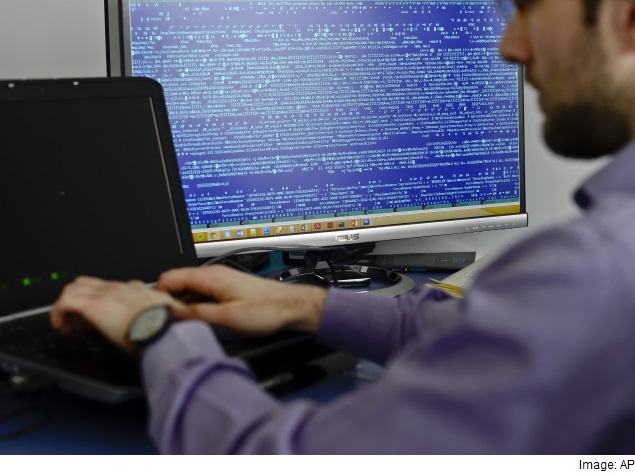In a stern warning, regulator Sebi has said anyone trying to manipulate
the markets with new-age trading technology tools would be slapped with
strong penal measures and a new framework is being put in place to
tackle cases like organised cyber-attacks from abroad.
On the other
hand, the risk management systems in the marketplace have been upgraded
to ensure that the damage from any genuine technical snags, including in
the algorithmic and high-frequency trades, is minimised and the issues
are addressed on an urgent basis, Sebi Chairman U K Sinha said.
"What
I am saying is that a technology snag can happen anywhere in the world.
But our system is designed for how to minimise the impact of the snag,"
Sinha told PTI in an interview in Mumbai.
"If, it is deliberate,
then we have a system for how to penalise the person. We will take stern
action against the person who is found to be deliberately doing it."
Asked
about a recent technical 'glitch' causing nearly four-hour halt at the
New York Stock Exchange (NYSE), Sinha said the problems can happen
anywhere including in India.
"Technology is always a double-edged
sword and problems can happen. Problems have happened in India also in
the past. On high-frequency trading, algorithmic trades, co-location, we
have already put in place some restrictions and have issued a circular
about penalties etc," he said.
On the issue of cyber-attacks,
Sinha said the overall marketplace, the exchanges and the regulator
itself need to be alert and Securities and Exchange Board of India
(Sebi) is working on a detailed framework to deal with such cases.
"For
matters like cyber-attacks, we have to be alert. We are in the process
of sensitising everybody about this. "We are preparing the exchanges. We
have some thoughts on this and we have told the exchanges to do certain
things, but may be more needs to be done," he said, without disclosing
any further details on this.
Talking in detail about the steps
taken by Sebi to beef up the risk management systems to deal with
technical snags as also with the deliberate manipulative attempts, Sinha
said the regulator has taken a series of measures on order checks.
"You
can not place an order for more than a certain limit. There are all
kinds of checks, at client level, trader-level system-level, all those
have been provided... If there is a genuine mistake in the algorithm
system, we have got enough checks and safeguards. Then there is another
situation, that is if trading is taking place and if an algorithm or a
computer programme has gone bad, then how to minimise the damage? For
that, we have systems and checks in place... These are the cases where
there is a genuine mistake. There is also a situation, when question
arises should the trade be cancelled or not. For that, we have come out
with an annulment policy," he said.
"If somebody is doing it
deliberately, we have a surveillance mechanism to take action against
them. Whether we have enough mechanism to stop them, I would not claim
that much. But we can certainly catch them and penalise them," Sinha
added.
On the third dimension of cyber-attacks, the Sebi chief
said, "Till 2-3 years back, nobody thought that there could be something
like a cyber-attack to deliberately disturb the whole system. But there
is a genuine worry now all over the world. So we have issued our
guidelines on that as well. However, I would like to tell you that we
are in constant dialogue with the exchanges, clearing corporations and
depositories that how careful we need to be on this and how we should
check that... That is a worry all over the world. Even in case of NYSE,
the initial worry was that it is a cyber-attack but then they clarified
that it was a technology snag."
The investigations in the US
showed that the 'technical glitch' at NYSE was caused by some 'internal
software upgrade' and despite initial worries, the regulators and other
agencies ruled out any external reasons such as cyber-attacks. This was
the biggest outage to hit the US markets in nearly two years after
trading in all Nasdaq-listed stocks remained frozen for nearly three
hours in August 2013.
While there have been several cases of such
'technical glitches' hitting the stock exchanges abroad, the Indian
markets have been relatively better off on this front.
Sebi has
been asking the stock exchanges and other market entities to take
necessary steps from time to time to assess the robustness of their
systems to avoid any software-related or other technical disruptions.
The
regulator has also been conducting regular audits of the software
systems in use to avoid any technical glitches. Earlier this month, Sebi
issued a new set of guidelines for the stock exchanges and other market
infrastructure institutions to safeguard their systems, networks, and
databases from cyber-attacks.
Asking all exchanges, clearing
corporations and depositories to implement necessary changes within six
months, Sebi said these Market Infrastructure Institutions (MIIs) need
to have a robust cyber-security framework to provide essential
facilities and perform systemically critical functions of trading,
clearing and settlement in securities market.
 Ubisoft Says It’s Probing a Possible ‘Data Security Incident’25 December 2023
Ubisoft Says It’s Probing a Possible ‘Data Security Incident’25 December 2023 US SEC Set to Adopt New Cyber Rule, Unveils Brokerage AI Proposal26 July 2023
US SEC Set to Adopt New Cyber Rule, Unveils Brokerage AI Proposal26 July 2023 India Witnessed 36.29 Lakh Cybersecurity Incidents From 2019 to June, Government Says19 July 2022
India Witnessed 36.29 Lakh Cybersecurity Incidents From 2019 to June, Government Says19 July 2022 FBI Director Claims Iranian Hackers Attempted to Target Boston Hospital Last Year to Disrupt Services2 June 2022
FBI Director Claims Iranian Hackers Attempted to Target Boston Hospital Last Year to Disrupt Services2 June 2022 Ransomware GoodWill Detected in India, Makes Victims Donate to Fake Causes: Cloudsek23 May 2022
Ransomware GoodWill Detected in India, Makes Victims Donate to Fake Causes: Cloudsek23 May 2022




![Gadgets 360 With Technical Guruji: News of the Week [April 12, 2024]](https://c.ndtvimg.com/2025-04/jlpk5kco_news-of-the-week_160x120_12_April_25.jpg?downsize=180:*)










